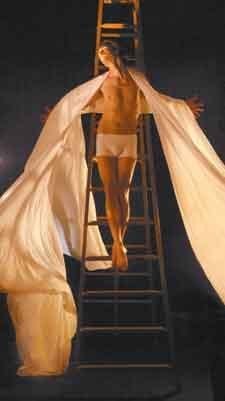A boy and his father fashion wings from feathers and wax and miraculously take to the sky. The father seeks only to escape his island exile, but his son Icarus flies ever nearer the sun. The wax wings melt, and Icarus plummets to earth, a victim of his father’s hubris and his own reckless daring.
Playwright/actor/clown/artist David Tomlinson has long been fascinated with the Greek myth of Icarus. His own adaptation, Sunstroke: Icarus Speaks, premiered at the Rhubarb Festival a few years back, with Tomlinson turning in a riveting performance as the doomed youth. His Icarus, reimagined as a troubled gay son, ruminates on intense relationships with both lover Thamyris and father Daedalus as he soars and falls.
The one-man show was a hit with audiences but left Tomlinson and director Diana Kolpak feeling there was more story to tell. Tomlinson spent two years creating additional monologues dealing with familial responsibility and disappointment. The result is Wingéd, a three-act play about boys who fly.
“There’s something so compelling to me about the father and the son’s relationship and how it affects Icarus’s relationship with his lover,” says Tomlinson. “The response was so great that we began to discuss how it could go further. That’s when Diana looked at me and said, ‘You know, Lucifer also had wings.’”
Turns out Lucifer is also dealing with his own father issues, what with the falling out he had with God. Rather than being the cloven-footed mustache-twirler of Dante’s Inferno, Tomlinson’s Lucifer is besotted with humanity. He strives to better mankind’s lot in life, only to be thwarted by his distant, disapproving creator in Red Eye Open: The Lucifer Illuminations.
“It’s the tale of the prodigy,” Tomlinson explains. “He’s the one who works so hard to excel and make his father proud but becomes angry at God for not sharing his passionate viewpoint. So Lucifer becomes the Fallen.”
The third character in Wingéd is Phoenix, based on the mythic bird of fire and resurrection. In Rise: The Song of the Phoenix, a young man is tormented by sexual abuse at the hands of a close male relative. He seeks to end his abuser’s legacy in a torrent of flame and retribution until another path reveals itself to him.
“The Phoenix was the most interesting and challenging to write,” says Tomlinson. “Icarus was the emotional side of the story, Lucifer the mental, so Phoenix is the physical body of abuse. He has to make this very dramatic decision about vengeance. Will he act out, or will he transform into something else?”
Director Kolpak had been involved with the piece from its inception during a writing workshop and believes Tomlinson’s examinations of the father-son dynamic go far beyond ancient myth and gender.
“David’s made it very personal and tapped into the really emotional core of the myths,” she says. “He calls it a love letter to the male heart, but I say it’s to the human heart, because it teaches us that we don’t have to hang on to and be bound by the pain and history we’ve inflicted upon each other. We need to move beyond that to survive and evolve as a civilization.”
With such deeply personal themes, it’s natural to wonder how much of Wingéd is drawn from the writer’s own history as a gay man growing up in a complicated, frequently hostile environment. Tomlinson is tactful in his response.
“My relationship with my father was certainly not as positive growing up as it is now,” he says. “But I recognized our differences and was able to appreciate the things about him that were awesome.
“I let go of the expectations of what I wanted and acknowledged what it is that I have, and that’s very much the journey that Icarus goes on. It’s a cycle of life, death and resurrection. It’s hope.”

 Why you can trust Xtra
Why you can trust Xtra


